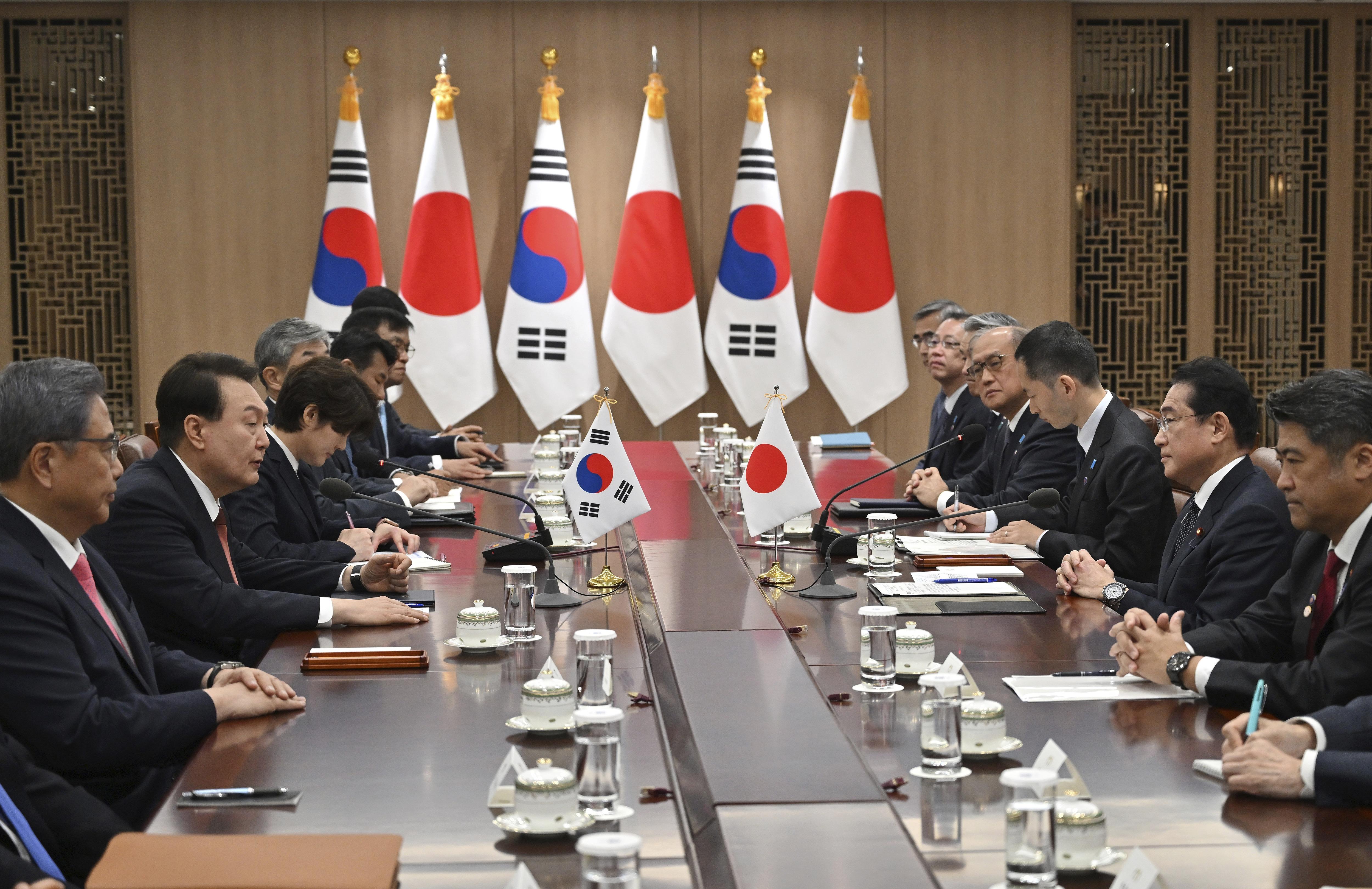 South Korean President Yoon Suk-yeol (second, left), talks with Japanese Prime Minister Fumio Kishida (second, right), during their meeting at the presidential office in Seoul, May 7, 2023. (PHOTO / POOL / AP)
South Korean President Yoon Suk-yeol (second, left), talks with Japanese Prime Minister Fumio Kishida (second, right), during their meeting at the presidential office in Seoul, May 7, 2023. (PHOTO / POOL / AP)
SEOUL – Japanese Prime Minister Fumio Kishida met with South Korean lawmakers and business leaders in Seoul on Monday to discuss potential bilateral cooperation as he wrapped up the first visit by a Japanese leader in 12 years.
Kishida and the leaders of various business groups hoped the meeting, which saw talks about building a resilient supply chain and promoting industrial cooperation in cutting-edge technology, would strengthen economic ties between the two countries, according to Japan's foreign ministry.
I would like to strengthen the relationship I have with (South Korean) President Yoon and join forces with him to forge a new era.
Fumio Kishida, Japanese prime minister
"I would like to strengthen the relationship I have with (South Korean) President Yoon and join forces with him to forge a new era," Kishida told reporters in Seoul after meeting with South Korean lawmakers at his hotel.
READ MORE: Japan PM Kishida to visit South Korea, meet Yoon on Sunday
Kishida told South Koreans on Sunday his "heart hurts" when he thinks of suffering during Japanese colonial rule of South Korea. His remark was seen as a nod to historical disputes that have soured relations between the two US allies but fell short of offering a new apology.
He arrived in South Korea on Sunday following South Korean President Yoon Suk-yeol's trip to Tokyo in March where they sought to close a chapter on the historical disputes that have dominated Japan-South Korea relations for decades.
Several South Korean organizations rallied in Seoul Sunday to protest Japanese Prime Minister Fumio Kishida's visit to South Korea.
The protesters called for Tokyo's apology over its militarist past, opposed South Korea-Japan military cooperation, and demanded withdrawal of Japan's plan to discharge radioactive wastewater.
A group of activists from the Solidarity for Peace and Reunification of Korea (SPARK) gathered near the South Korean presidential office in central Seoul, where Kishida held talks with South Korean President Yoon Suk-yeol.
"Japan should apologize for its illegal colonial rule and withdraw the Fukushima contaminated water discharge plan," the protesters chanted.
"The (South) Korean and Japanese governments continue to say, 'Let's move into the future with the historical issues covered up and unresolved. A righteous solution to the historical issues will be needed to move toward the future of genuine peace," Moon Ga-on, a college student, told Xinhua while attending the rally.
 South Korean organizations rally in Seoul to protest Japanese Prime Minister Fumio Kishida's visit to South Korea, May 7, 2023. (PHOTO / XINHUA)
South Korean organizations rally in Seoul to protest Japanese Prime Minister Fumio Kishida's visit to South Korea, May 7, 2023. (PHOTO / XINHUA)
South Korea unveiled a proposal in March to compensate South Korean victims of Japan's forced wartime labor through a government-backed foundation financed by private-sector donations, which triggered strong backlash at home.
Forced labor victims and sex slavery victims, who were forced by the Imperial Japan into sex servitude for military brothels during World War II, have demanded that the Japanese government sincerely apologize for its wartime atrocities.
Kishida told a joint press conference with Yoon that his cabinet will continue to inherit the positions of previous cabinets as a whole in terms of historical perception, saying his heart ached over people who suffered hard and sad things.
ALSO READ: Old disputes overshadow visit by Japan's Kishida to S. Korea
His remarks could be difficult to soothe the victims as most of the previous Japanese cabinets failed to acknowledge its responsibility and make a sincere apology for the wartime brutalities.
With regard to Japan's plan to discharge tritium-laced wastewater from its crippled Fukushima Daiichi nuclear power plant into the Pacific this year, Oh Mi-jung, one of SPARK activists, told Xinhua that it will pollute the marine environment and threaten the lives and safety of people all over the world.
"Japan is a country that was devastated by atomic bombs in 1945 … The plan to dump the radioactive contaminated water into the Pacific approved by the Japanese government, which is fully aware of nuclear and radioactive damages, will endanger the lives and safety of people around the world," the activist noted.
Ahead of Kishida's trip to Seoul, about 5,000 protesters held a candlelight rally in Seoul on Saturday night, opposing the Japanese prime minister's visit without an apology for historical issues.
They also called on Japan to abandon the tritium-laced water discharge plan, urging the South Korean government to stop its diplomacy obedient to Japan and the United States.